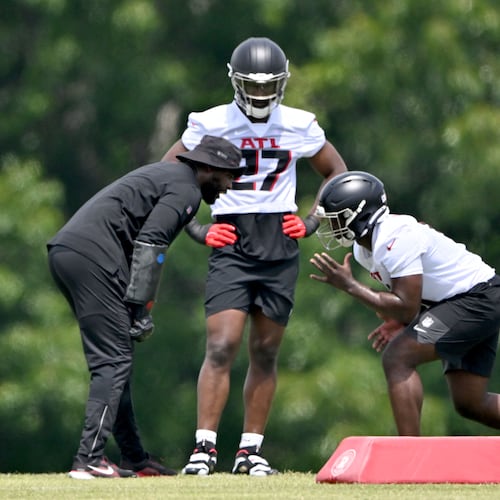Julio Jones plays the most me-me-me of football positions. That’s not him. “Just throw me the damn ball” was a great name for a book (never read it) and certainly captured the essence of Keyshawn Johnson but not every wide receiver or every superstar athlete obsesses over his statistics or which direction the spotlight is pointed.
“I went to Alabama,” Jones said. “I didn’t care about the ball. We ran the ball.”
And between his catches, he crushed defensive backs with his blocking.
Julio Jones is entering his sixth season with the Falcons. If it was up to him, it will be unlike any other, certainly unlike the last three. There has been too much losing, too few playoff games, too many games when he stood out as a highlight on the otherwise afterthought of a team.
In three years at Alabama, Jones played on teams that finished 12-2, 14-0 and 10-3 (36-5).
In the last three in Atlanta, he played on teams that finished 4-12, 6-10 and 8-8 (18-30).
With Alabama, he won a national championship, an SEC championship, two division titles and played in three major bowl games.
With the Falcons, he has won a blur of personal honors, including Pro Bowls, All-Pro designations and a receiving title, but has failed to reach the postseason in the last three seasons, won just one playoff game and was on the wrong side of final scores against reclamation projects like Brian Hoyer and Blaine Gabbert.
Personal accomplishments got old a long time ago. It’s why after his freshman year in high school, Jones said he became bored running track and quit (though he still competed and won in the long jump, high jump and triple jump).
“Every time I ran, I won,” he said. “But I was winning so much, I didn’t feel like I was accomplishing anything. I just expected to win. I wanted team stuff. I wanted something where I could work with others as a unit.”
He’s suddenly one of only five player left from his rookie year and is being asked to take on a greater leadership role, a bit of a challenge for a quiet, more of a lead-by-example guy.
He admits the past few seasons have been difficult after experiencing so much winning in college, but said, "You can't allow yourself to get frustrated. You change the team so much in the NFL and in college you've got scholarships and walk-ons and a lot of the guys are going to be there for four years. In this business guys get cut or they leave for more money."
In March, Jones also saw the Falcons release his close friend, Roddy White. They were polar opposites in terms of personality — White being far more talkative and gregarious — but clicked from Year 1. "It's a respect thing," he said. "It doesn't matter what kind of personality you have."
Did he expect White to get released?
“No. But you never see it coming.”
Similarly, Jones didn’t see the Falcons’ spiraling coming after they went to the NFC title game in his second season in 2012. It’s one reason why he has been so measured in his comments when asked about potential improvement in the offense and the team. A few days ago, when a media member asked about quarterback Matt Ryan’s comment that the Falcons may score 30 points per game, Jones wouldn’t bite.
“That’s what Matt said. We’re still in camp. When the season comes around, we’ll see,” he said.
Asked later about being so guarded, he said, “You just don’t know. I can’t predict the future. You can’t assume anything. But I will say this: I feel like we’ve been doing a good job this year. We’re communicating as players a lot more about what the standard should be, rather than just relying on the coaches to set the standard.”
The Falcons' locker room was a bit fractured in the Mike Smith's last two seasons and coach Dan Quinn and general manager Thomas Dimitroff have attempted to fix that. As Dimitroff said recently, "We've learned from past mistakes. We've learned from players who we brought in who weren't the ideal fit."
That never seemed to be an issue in Tuscaloosa. Jones never imagined the Falcons would fall as far as they did in 2013 and 2014, but he said, “For years, everybody was here. Then Michael T (Turner) was gone and Tony Gonzalez left and we lost some other important guys. It’s hard to bring in new people and everybody get on the same page.”
Asked about the season, he said only, “We’ll see.”
He’s tired of running sprints alone.
About the Author
Keep Reading
The Latest
Featured

